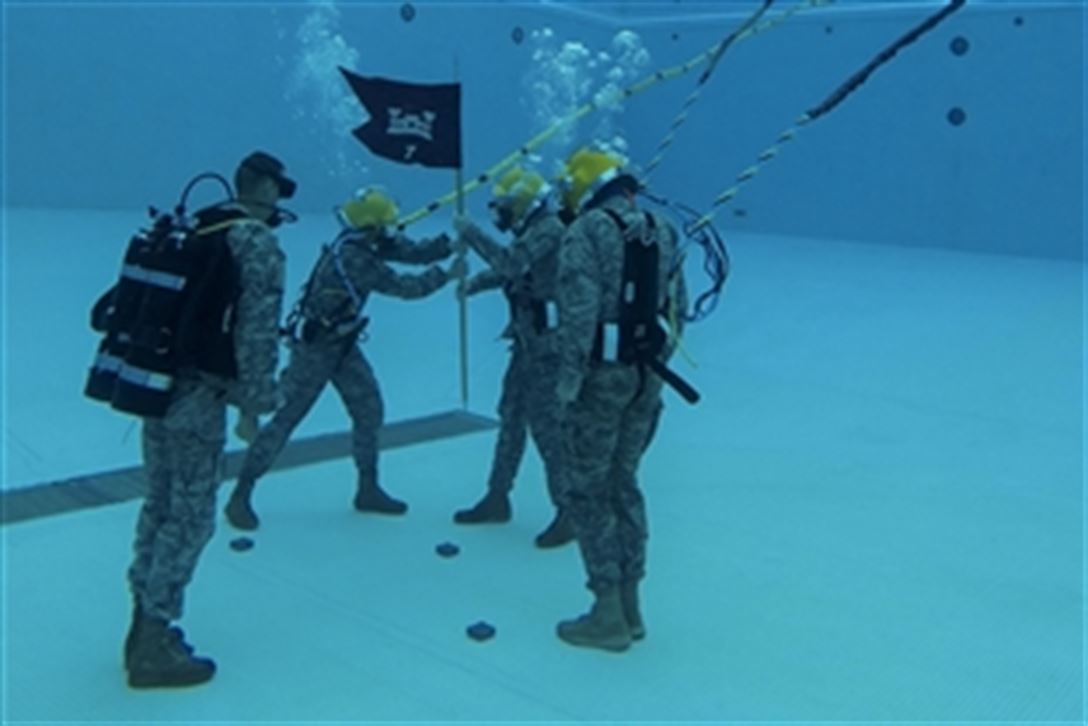
Soldiers perform a change-of-command ceremony in a pool on Schofield Barracks, Hawaii, Dec. 18, 2014. DoD Photo
If there’s one thing that service members, veterans, and their families are able to do, it’s adapt. There are many more things that they can do, but adaptability is one of the most important. Things change in the military literally overnight. While deployed to Afghanistan, the time for my next assignment came up. I pulled it up on the computer and it said that I was being sent to Fort Shafter in Hawaii…great! We weren’t too excited about moving, and thought we were going to be able to stay in Colorado, but there sure are worse places to be stationed. I checked it again a couple days later and…my assignment had been changed. Fort Leonard Wood, Missouri. Not so great.
I ended up going to neither, in the end…I volunteered to redeploy to Afghanistan again sooner than I should have. Tells you something about Fort Leonard Wood that someone volunteers to go back to combat instead of being stationed there, right?
So we have these changes that we go through. My wife and I lived in nine apartments in the first ten years of our marriage. Our kids went to four elementary schools. The big changes are something that we adapt to easily. There is a paradox, however; while we are able to adapt to huge changes that would make other people’s head spin, we don’t do a very good job at adapting to small changes. The daily stuff. That’s where things break down and we can get super frustrated.
Adaptability to Large Change
It’s a well known fact that military life comes with change. In twenty-two years, I had five duty stations, which is less than many, as I spent the last seven years at one post. I should say that my family spent the last seven years there, because there wasn’t a single year between 2006 and 2013 that I wasn’t gone part of or the entire year. In those five duty stations, I had over a dozen different jobs. If that doesn’t prepare veterans for a gig economy, I don’t know what does. I had countless numbers of supervisors…three platoon sergeants and five squad leaders in my first three years alone. That’s an incredible amount of turnover.
So miltiary service members are used to big change in their lives. Entire units move from one post to another, individuals move from one post to another, people are gone seemingly overnight. We are reassigned according to the needs of the military, and expect it. We may not like it all the time…see the story above about the switch between Hawaii and Missouri…but we do it. Then…we get out of the military. The big changes don’t happen as much. That requires adjusting to a different type of change..
Lack of Adaptability to Small Change
So we’re great at big change. New duty station? Got it. Moving to a different job? We’ll figure it out. We may not like it, we may gripe, but soldiers have been complaining since Valley Forge, that’s nothing new. But when it comes to small change, we lose our minds.
Is the dining facility or the arms room opening fifteen minutes later than it should? Is the gate that we normally go through every morning on the way to work closed for some reason? We flip our lid. Sometimes, an entire morning or an entire day is ruined. We can shrug off someone telling us that the deployment timeline has been moved up, so we’re leaving in six months instead of a year and a half. We can’t shrug off someone telling us that the field exercise timeline has been moved up, so we’re leaving tomorrow instead of next week. Why is that?
The Difference Between Adaptability and Flexibility
Some of this may be in the difference between adaptability and flexility. Adaptability can be defined as the ability to adjust to new conditions. This is certainly in effect when it comes to new duty stations, houses, jobs, schools. Flexility can be defined as a willingness to change and compromise…that’s where the paradox exists. It’s in our willingness to change, not our ability.
When someone enlists in the military, they are told from the beginning…you’re going to be changing a lot. You’re only here for a short period of time. You are willing to adapt, because you have no choice…you accept that this is the way things are going to be. You have the ability to prepare for it…because preparation is a neurological process that helps us cope with the unexpected.
Service members have been described as a lot of things, but flexible isn’t often one of them. Rigid, steadfast, regimented…all of these things apply. That rigidity helps with the adaptability; when I left Germany for Fort Bragg, the cultures were completely different. The 82nd Airborne Division is a culture all it’s own. The changes I had to adapt to were huge…but a Sergeant was a Sergeant and a Captain was a Captain. You still did Physical Training at 6:30 AM and there was a dining facility to eat at. That type of consistency supports the adaptability.
Developing Flexibility to Augment Adaptability
In post-military life, there is a need to be flexible as well as adaptable. There are no more Sergeants or Captains. There is no standardization to support adaptability from one location to another, so service members and their families need to learn flexibility. Some of that flexibility is learning patience…another quality that I have had to cultivate. We need to learn perspective, to consider things in longer terms than the next eighteen to twenty-four months.
The adaptability paradox…service members, veterans, and their families are able to cope well with large changes in their lives, but are challenged by small changes in their lives…can be resolved by recognizing the fact that the large changes may no longer be necessary, and flexibility is needed to adapt to the small changes. In that way, things will be a lot more pleasant in post-military life.

